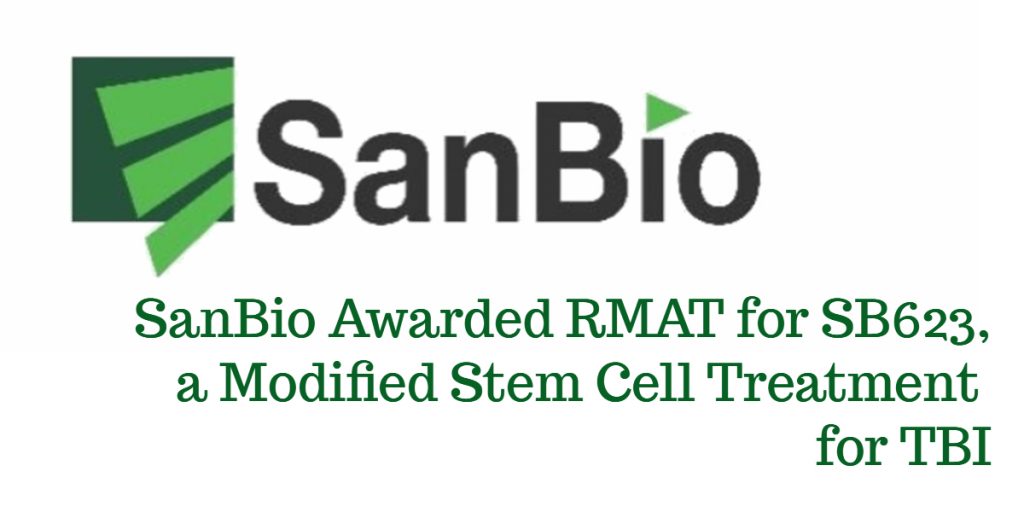SanBio, a company developing regenerative cell medicines for neurological disorders, has been awarded a regenerative medicine advanced therapy (RMAT) designation from the US Food and Drug Administration (FDA) for SB623.
SB623 is a cell therapy that the company has developed for the treatment of chronic neurological motor deficits that occur as a result of traumatic brain injury (TBI). In addition to this treatment, SanBio is developing regenerative therapies for stroke, diseases of the eye, Parkinson’s disease (PD), and other neurological conditions.
U.S FDA RMATs
Prior to this award for SanBio, 30 RMAT designations had been publicly announced, with the most recent being Krystal Biotech’s RMAT for KB103 on June 24, 2019 and Sangamo Therapeutics’ RMAT for SB-525 on July 5, 2019.
You can view a full list of RMAT designations here.
This makes SB623 the 31st publicly announced RMAT designation. However, the FDA states it has received 108 total requests for RMAT designations and granted 40.
SanBio’s RMAT for SB623
Companies who are developing cell and gene therapies are eligible to obtain an RMAT designation from the U.S. FDA if their product can treat serious or life-threatening diseases and there’s preliminary clinical evidence that it can address unmet medical needs.
Based on SanBio’s phase 2 clinical study of its modified stem cells in traumatic brain injury (STEMTRA), SB623 meets this criteria.
The company’s STEMTRA (“Study of Modified Stem Cells in Traumatic Brain Injury”) trial examined the effects of SB623 cells in patients with chronic deficits resulting from TBI. It was a global study that involved approximately 25 clinical trial sites throughout the U.S. and five sites in Japan.
It had enrollment of approximately 61 patients. Each patient was one-year or more post brain injury and experiencing ongoing motor impairments. Participants received intracranial administration of SB623 cell and the study was completed on March 5, 2019.
While the primary purpose of the STEMTRA trial was to evaluate the clinical efficacy of SB623 cells on patients with chronic motor deficit from TBI, its secondary purpose was to evaluate the effect of the trial protocol on disability parameters and determine the safety and tolerability of intracranial administration of SB623 cells.
Intracranial administration means there was direct implantation of SB623 cells into the brain of each trial participant.
SC623 Cell Therapy
According to ClinicalTrials.gov:
“SB623 cells are adult bone-marrow-derived cells that are transiently transfected with a plasmid construct encoding the intracellular domain of human Notch-1. These cells produce trophic factors that protect neurons in models of ischemic insult.
In a rat contusion model of TBI, implantation of SB623 around the area of the injury resulted in significant improvement of motor function.
A 2-year Phase 1/2A dose escalation study (NCT01287936) of SB623 stereotactically implanted into the brains of patients with chronic motor deficits due to ischemic stroke has completed. The study has shown statistically-significant improvements in motor function in each of three scales: the European Stroke Scale (ESS), the National Institute of Health Stroke Scale (NIHSS) and the Fugl-Meyer scale.”
Next Steps for SanBio’s SB623
The next step for SanBio will be to undertake a Phase 3 clinical trial for SB623 for the treatment of chronic neurological motor deficits caused by TBI by early 2021.
To learn more about SB623, review its study at ClinicalTrials.gov (NCT02416492). Or, you can access a full list of RMAT designations here.
Have questions about SB623? Ask them in the comments below.
